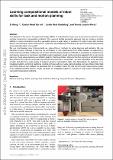Learning compositional models of robot skills for task and motion planning
Author(s)
Wang, Zi; Garrett, Caelan Reed; Kaelbling, Leslie Pack; Lozano-Pérez, Tomás
DownloadAccepted version (14.19Mb)
Open Access Policy
Open Access Policy
Creative Commons Attribution-Noncommercial-Share Alike
Terms of use
Metadata
Show full item recordAbstract
<jats:p> The objective of this work is to augment the basic abilities of a robot by learning to use sensorimotor primitives to solve complex long-horizon manipulation problems. This requires flexible generative planning that can combine primitive abilities in novel combinations and, thus, generalize across a wide variety of problems. In order to plan with primitive actions, we must have models of the actions: under what circumstances will executing this primitive successfully achieve some particular effect in the world? We use, and develop novel improvements to, state-of-the-art methods for active learning and sampling. We use Gaussian process methods for learning the constraints on skill effectiveness from small numbers of expensive-to-collect training examples. In addition, we develop efficient adaptive sampling methods for generating a comprehensive and diverse sequence of continuous candidate control parameter values (such as pouring waypoints for a cup) during planning. These values become end-effector goals for traditional motion planners that then solve for a full robot motion that performs the skill. By using learning and planning methods in conjunction, we take advantage of the strengths of each and plan for a wide variety of complex dynamic manipulation tasks. We demonstrate our approach in an integrated system, combining traditional robotics primitives with our newly learned models using an efficient robot task and motion planner. We evaluate our approach both in simulation and in the real world through measuring the quality of the selected primitive actions. Finally, we apply our integrated system to a variety of long-horizon simulated and real-world manipulation problems. </jats:p>
Date issued
2021Department
Massachusetts Institute of Technology. Computer Science and Artificial Intelligence LaboratoryJournal
International Journal of Robotics Research
Publisher
SAGE Publications
Citation
Wang, Zi, Garrett, Caelan Reed, Kaelbling, Leslie Pack and Lozano-Pérez, Tomás. 2021. "Learning compositional models of robot skills for task and motion planning." International Journal of Robotics Research, 40 (6-7).
Version: Author's final manuscript